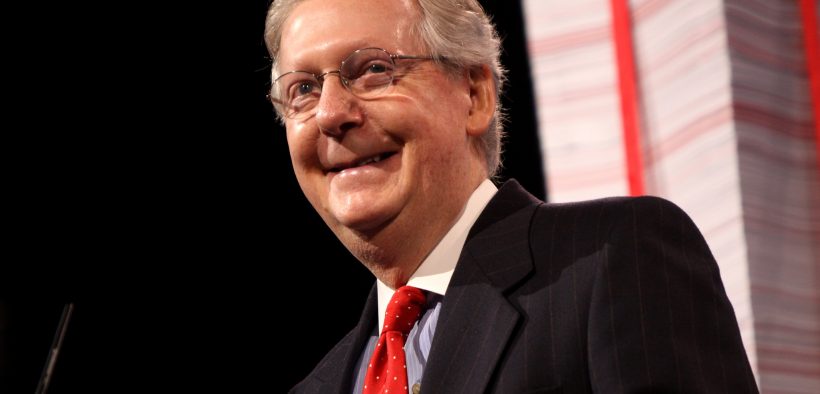McConnell and Schumer Can’t Agree on Impeachment Trial Rules, with Possible Election Consequences

“Senators who oppose this plan will have to explain why less evidence is better than more evidence. Again, let me say that to every senator in this room, Democrat and Republican, senators who oppose this plan will have to explain why less evidence is better than more evidence,” – Senate Minority Leader Chuck Schumer
Before a senate trial on President Donald Trump’s impeachment, the house must agree on rules governing it, which it has failed to do. Senate Majority Leader Mitch McConnell, Republican, and Minority Leader Chuck Schumer, Democrat, are leading the partisan fight over what evidence and witnesses to allow. On Tuesday, McConnell formerly rejected Schumer’s demands for witnesses to be present at the proceedings, according to a CNN report.
A Public Argument Over Rules
McConnell defended the process by pushing the burden of hearing witnesses back on the House of Representatives, which held an impeachment hearing before voting to impeach Trump. However, the House of Representatives did in fact subpoena records and administration officials, subpoenas which were categorically ignored.
“The House chose this road. It is their duty to investigate. It is their duty to meet the very high bar for undoing a national election,” the Kentucky Republican said in his speech on the Senate floor. “If they fail, they fail. It is not the Senate’s job to leap into the breach and search desperately for ways to get to ‘guilty.’ That would hardly be impartial justice.”
Like the House of Representatives, Schumer presented a list of documents and two officials, White House Chief of Staff Mick Mulvaney and former National Security Advisor John Bolton, that he would like to testify in the senate trial.
“Senators who oppose this plan will have to explain why less evidence is better than more evidence. Again, let me say that to every senator in this room, Democrat and Republican, senators who oppose this plan will have to explain why less evidence is better than more evidence,” Schumer responded on Tuesday. “And they’re going to have to explain that position to a public that is understandably skeptical when they see an administration suppressing evidence and blocking senior officials from telling the truth about what they know.”
The minority leader’s request for evidence to be permitted came on the heels of new emails which were released by the Pentagon on Friday. They provided more details on the timeline of Trump’s request to withhold military aid to Ukraine. Critically, the White House budget office gave the order for the funds to be suspended a mere 90 minutes after Trump’s phone call with Ukrainian President Volodymyr Zelensky.
As these documents, 146 pages long, were not available for the House’s impeachment hearing, a Senate trial would be the first opportunity congressmen would have to consider them in the impeachment case.
New Evidence Could Play a Role
Schumer seeks even more records from the White House, State Department, and Office of Management and Budget, CBS News reported.
“We don’t know what these documents will say, just as we don’t know what the witnesses will say … but they should come out we should see these documents no matter that they say,” Schumer said in a Monday press conference.
There is precedent for not allowing witnesses to appear in person. During the trial of former President Bill Clinton, the Senate approved of witnesses giving depositions in lieu of actually appearing during the trial. That decision was not even decided upon until the trial was already underway, McConnell said.
By blocking the admission of new evidence and witnesses, he is limiting the trial to the scope of material already presented during the House’s hearing. The problem with this approach, as Schumer views it, is that new evidence might shed more light on how Trump’s call with Zelensky came to impact congressionally-approved military aid.
Whereas McConnell wants to replicate the impeachment trial of Clinton, Schumer argued the cases are incomparable because the Clinton administration complied with House subpoenas, unlike the Trump White House, Burgess Everett reported for Politico. Although that is the case, impeachment trials are rare enough that precedence is severely lacking, but as the Constitution explicitly affords the Senate responsibility for establishing rules for the hearing, effectively giving it carte blanche.
Consequences Could Extend to the 2020 Election
The consequences of Schumer and McConnell feuding over rules extend beyond the obvious effect of a delayed trial; Americans are robbed of a resolution to the ordeal. Schumer referenced a Washington Post/ABC survey in which 71 percent of respondents indicated they would like to see witnesses at the trial. McConnell’s refusal to agree to the demand may have an effect on the 2020 congressional election. With the Democrats holding the House and Republicans barely maintaining a lead in the Senate, the GOP must factor the impeachment into its equation when it looks to keep the Senate.
The Republicans face the added complication of losing 28 incumbents who have decided not to run for office again, four of which are senators, according to Russell Berman at The Atlantic. By holding up the impeachment trial over rules on witnesses and evidence, they are giving more ammunition for Democrats to campaign with, a prospect which could put rookie candidates in a difficult position to defend.
After 2 years of a special counsel investigation and 3 months of impeachment inquiry and hearings, the American people may look at the delay for a trial as a further delay for closure. If Schumer could sway just four Republican senators, he could have his way for the trial rules, but so far there has been no evidence of any possible defectors. Until such a time, it falls upon the two leaders to reach an agreement, but that too seems a remote possibility after the banter between them.













